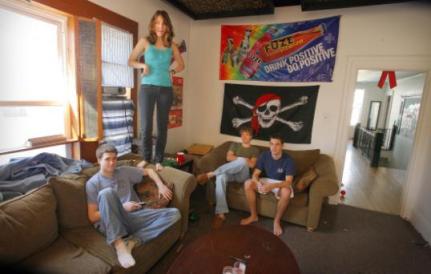 Ruling Calls Into Question Boston Ordinance Prohibiting 5 or More Students In One Unit
Ruling Calls Into Question Boston Ordinance Prohibiting 5 or More Students In One Unit
Those screams you are hearing now on Comm. Ave. aren’t the students. They are the landlords who are undoubtedly rejoicing upon news that the Supreme Judicial Court just issued a major ruling in how student rentals occupancy limits — indeed all rentals — will be treated by housing inspectors and licensing authorities. This is an important decision which may have far-ranging implications across the state and not just to student housing.
The closely watched case is City of Worcester v. College Hill Properties (download link to case here) where the SJC has held that renting to 4 or more students in one apartment unit of a two and three family home is not a “lodging house” requiring a special license under the Massachusetts lodging housing law, provided that the apartment meets all other sanitary and building code square footage occupancy thresholds. The state code requires 150 s.f. of living space for the first occupancy and 100 s.f. for each additional person (3 occupants = 350 s.f. of living space), and 70 s.f. of bedroom space for the 1st person, plus 50 s.f. for additional person (120 s.f. for 2 persons in one bedroom). This decision applies state-wide and to every type of rental housing, including multi-families, buildings and townhouses.
The timing of the ruling is interesting in light of the recent fatal fire involving an overcrowded student apartment house in Allston and Mayor Menino’s recent rental property registration and inspection rules.
Court’s Reasoning: Apartments ≠ Lodging Houses
For history buffs, the opinion is fun to read as it traces the Lodging House Law back to the days of brothels, houses of ill-repute and tenements. Using a common-sense analysis, Justice Lenk reasoned that lodging houses, which are essentially temporary rentals of rooms without such amenities as a separate kitchens and bathrooms, are quite different from the modern day apartment units with its more expensive amenities. The court ruled that if an apartment satisfies the state sanitary and building code provisions for the amount of living/sleeping space, utilities, egress, etc., then it would be not be deemed a lodging house despite the number of unrelated occupants.
City of Boston Undergrad Student Rule On the Chopping Block?
In the City of Boston, a new zoning ordinance went into effect in 2008 prohibiting 5 or more undergraduate students from living in one apartment unit. There is certainly a question as to whether the College Hill ruling effectively overrules this ordinance. We will have to see whether the ordinance is challenged in court.
The other impact of this ruling is we should see an push for even more increased density in apartment rental housing which is exactly what Mayor Menino and the City of Boston doesn’t want.
More Press Coverage: Banker & Tradesman, Boston Globe, Worcester Telegram
_________________________________________
Richard D. Vetstein is an experienced Greater Boston landlord tenant attorney who represents rental property owners throughout Boston and Massachusetts. You can contact him at 508-620-5352 or at [email protected].
{ 4 comments }













